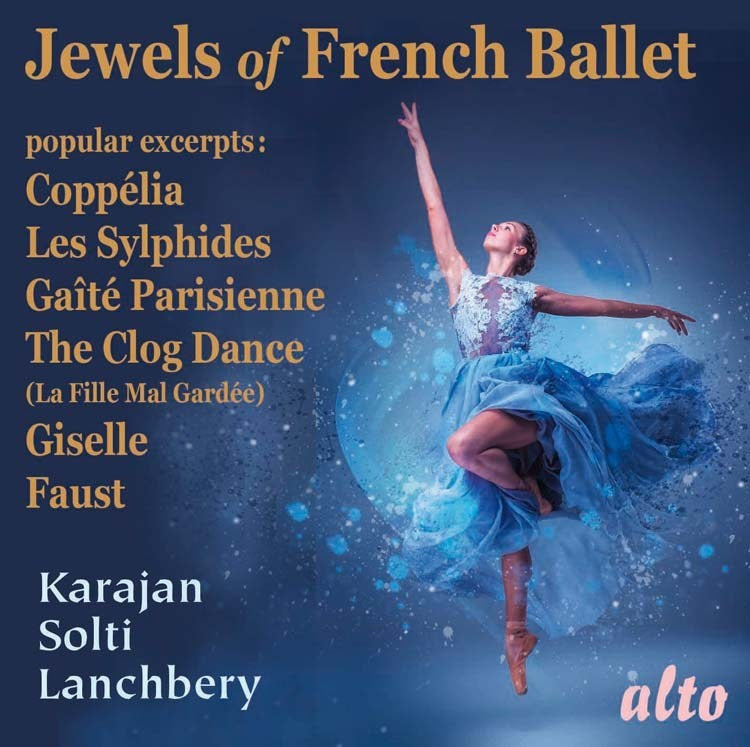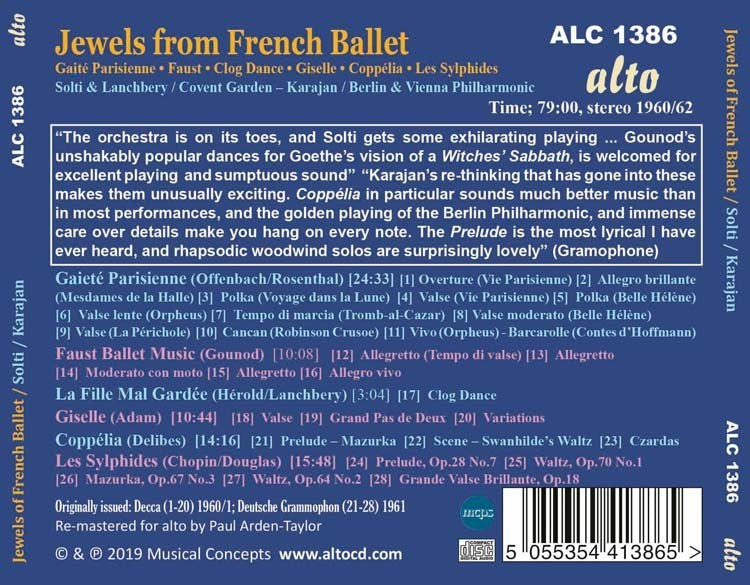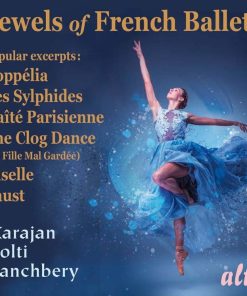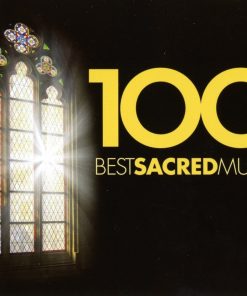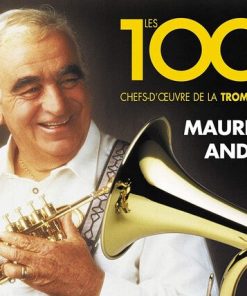JEWELS FROM FRENCH BALLET – SOLTI, KARAJAN, BERLIN PHILHARMONIC, VIENNA PHILHARMONIC ALTO
$ 6,99 $ 4,19
Jewels from French Ballet
Gaité Parisienne-Clog Dance -Faust-Giselle-Coppélia-Les Sylphides
Solti & Lanchbery /
/ Covent Garden
Karajan / Berlin & Vienna

“The orchestra is on its toes, and Solti gets some exhilarating playing … Gounod’s unshakably popular dances for Goethe’s vision of a Witches’ Sabbath, is welcomed for excellent playing and sumptuous sound” “Karajan’s re-thinking that has gone into these makes them unusually exciting. Coppélia in particular sounds much better music than in most performances, and the golden playing of the Berlin Philharmonic, and immense care over details make you hang on every note. The Prelude is the most lyrical I have ever heard, and rhapsodic woodwind solos are surprisingly lovely” (Gramophone)

Gaieté Parisienne (Offenbach/Rosenthal) [24:33][1] Overture (La Vie Parisienne) 1:57[2] Allegro brillante (Mesdames de la Halle) 1:04[3] Polka (Voyage dans la Lune) 1:47[4] Valse (La Vie Parisienne) 1:46[5] Polka (La Belle Hélène) 1:16[6] Valse lente (Orpheus) 3:08[7] Tempo di marcia (Tromb-al-Cazar) 1:20[8] Valse moderato (La Belle Hélène) 1:49[9] Valse (La Périchole) 2:50[10] Can-can (Robinson Crusoe) 1:57[11] Vivo (Orpheus) – Barcarolle (Contes d’Hoffmann) 5:33
Faust Ballet Music (Gounod) [10:08]
[12] Allegretto (Tempo di valse) 2:31[13] Allegretto 1:23[14] Moderato con moto 2:21 [15] Allegretto 1:37[16] Allegro vivo 2:13
La Fille Mal Gardée (Hérold/Lanchbery)
Giselle (Adam) [10:44] [18] Valse 2:45[19] Grand Pas de Deux 4:25[20] Variations 3:34
Coppélia (Delibes) [14:16] [21] Prelude – Mazurka 6:32[22] Scene – Swanhilde’s Waltz 3:31[23] Czardas 4:12
Les Sylphides (Chopin/Douglas) [15:48] [24] Prelude, Op.28 No.7 1:25[25] Waltz, Op.70 No.1 2:10[26] Mazurka, Op.67 No.3 1:53[27] Waltz, Op.64 No.2 4:23[28] Grande Valse Brillante, Op.18 5:55
Fast Shipping and Professional Packing
Due to our longstanding partnership with UPS FedEx DHL and other leading international carriers, we are able to provide a range of shipping options. Our warehouse staff are highly trained to pack your goods exactly according to the specifications that we supply. Your goods will undergo a thorough examination and will be safely packaged prior to being sent out. Everyday we deliver hundreds of packages to our customers from all over the world. This is an indication of our dedication to being the largest online retailer worldwide. Warehouses and distribution centers can be located in Europe as well as the USA.
Orders with more than 1 item are assigned processing periods for each item.
Before shipment, all ordered products will be thoroughly inspected. Today, most orders will be shipped within 48 hours. The estimated delivery time is between 3-7 days.
Returns
The stock is constantly changing. It's not entirely managed by us since we are involved with multiple parties such as the factory and our storage. The actual stock can fluctuate at any time. Please understand it may happen that your order will be out of stock when the order is placed.
Our policy is valid for 30 days. If you haven't received your product within 30 days, we're not able to issue either a return or exchange.
You are able to return a product if it is unused and in the same condition when you received it. It must also still remain in the original packaging.
